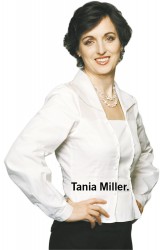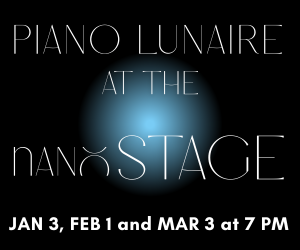Those who think that Victoria, BC, is still the land of “the newly wed and the nearly dead” need to update their impressions — at least where the local music scene is concerned. Better yet, they might like to plan a late winter/early spring getaway from the frigid, grey-toned rigours of Toronto to sample the mild, evergreen delights of the West Coast — including some remarkably adventurous concert programming.
 The Victoria Symphony: An institution not always renowned for breaking new musical ground — now does so regularly under the inspired and visionary leadership of Tania Miller. Currently celebrating her tenth anniversary as music director — the first Canadian woman to hold such a position — “Maestra” Miller (as she is known here) challenges and rewards orchestra members and audiences alike with fresh, revelatory readings of standard works, thematic mini-festivals and frequent forays into new and unusual repertoire.
The Victoria Symphony: An institution not always renowned for breaking new musical ground — now does so regularly under the inspired and visionary leadership of Tania Miller. Currently celebrating her tenth anniversary as music director — the first Canadian woman to hold such a position — “Maestra” Miller (as she is known here) challenges and rewards orchestra members and audiences alike with fresh, revelatory readings of standard works, thematic mini-festivals and frequent forays into new and unusual repertoire.
Already this season, Miller and the VS have teamed up with the University of Victoria and the Victoria Art Gallery to celebrate John Cage’s 100th birthday, and presented the world premiere of a major new orchestral work, Figures in the Night Passing, by the dean of Canadian composers, R. Murray Schafer. Coming up on March 15: a very special concert designed to climax a two-month, city-wide celebration of Victoria’s Chinatown, the oldest in Canada and second-oldest in North America (after San Francisco’s). The project epitomizes the VS’s commitment both to new music and to connecting classical music with the broader context of community life — particularly its multicultural dimensions.
 The highlight of the program is undoubtedly the world premiere of a 45-minute “symphonic theatre” creation, by Toronto-based composer Chan Ka Nin, called Harmonious Interest. The title is a reference to a striking and colourful structure called The Gate of Harmonious Interest that marks the entrance to Victoria’s Chinatown; the concert will take place just a few steps from that spot, in the McPherson Playhouse. A former Pantages vaudeville house, The Mac is about to celebrate its own centenary, along with its sister theatre, the Royal, which is the Symphony’s usual home base.
The highlight of the program is undoubtedly the world premiere of a 45-minute “symphonic theatre” creation, by Toronto-based composer Chan Ka Nin, called Harmonious Interest. The title is a reference to a striking and colourful structure called The Gate of Harmonious Interest that marks the entrance to Victoria’s Chinatown; the concert will take place just a few steps from that spot, in the McPherson Playhouse. A former Pantages vaudeville house, The Mac is about to celebrate its own centenary, along with its sister theatre, the Royal, which is the Symphony’s usual home base.
The seven-movement work is scored for orchestra, percussion soloist, hulusi (a Chinese reed instrument with drone pipes), plus two singer/actors and a dancer. Like Chan’s earlier opera, Iron Road, this new piece is a collaboration with librettist Mark Brownell and dramatizes the Chinese immigrant experience on the West Coast — and by extension across Canada. We follow a recently arrived labourer as he explores the city’s narrow, twisting Fan Tan Alley with its gambling rooms and opium dens, struggles to learn to be a Chinese cook, and dictates a letter home to his beloved wife.
The final movement of the work has already been heard once, at last summer’s Victoria Symphony Splash concert, where it was well received. Splash is an iconic annual outdoor event that attracts some 40,000 spectators to the Inner Harbour, where the orchestra performs on a barge, surrounded by enthusiastic listeners in kayaks. (The equivalent in terms of public impact would be if a quarter of a million people came to Harbourfront to hear the TSO.) Splash always takes place on the Sunday of BC Day weekend; next year will mark its 25th anniversary, and the year after that, the Victoria Symphony will celebrate its 75th anniversary.
But back to the March 15 concert: in addition to the world premiere of Chan’s Harmonious Interest, the program will also include Strange Air, by Dorothy Chang, a UBC associate professor. This piece was the inaugural commission from the Women’s Philharmonic Commissioning Project of Meet the Composer (now part of New Music USA), and was premiered at the Cabrillo Festival of Contemporary Music in Santa Cruz, CA, under the baton of the festival’s music director, Marin Alsop, herself a trailblazer for women in leadership roles in classical music. As well, VS concertmaster Terence Tam will be featured as soloist in the Butterfly Lovers’ Concerto, the well-known and accessible work written in 1959 by Chinese composers Chen Gang and He Zhanhao.
Vox Humana: The mid-March weekend in Victoria that starts with Friday evening’s VS “Chinatown” concert continues with a true embarrassment of riches, musically speaking. On Saturday and Sunday, the focus shifts to choral music — a genre with which this city is particularly well blessed. Easter comes early this year, and March 17 is Passion Sunday, a fact which one of our pre-eminent chamber choirs, Vox Humana, is acknowledging with back-to-back offerings: an ambitious doubleheader on the subject of the Passion.
On Saturday evening, under the ethereal dome of St. Andrew’s Roman Catholic Cathedral, Vox Humana will present a program that includes Arvo Pärt’s Passio for chorus, soloists and chamber orchestra. The piece represents the culmination of the composer’s tintinnabuli style. On Sunday afternoon, at St. Barnabas Church, the featured work will be the British Columbia premiere of The Little Match Girl Passion, by the hot New York-based composer (and co-founder of the Bang on a Can collective) David Lang. Synthesized out of influences that range from Hans Christian Andersen to Johann Sebastian Bach, the work won the 2008 Pulitzer Prize for Music. It has received a wide variety of innovative stagings in productions around the world — including one in London for shadow puppets, no less! The Victoria version will incorporate original choreography for three dancers.
Both the Saturday and Sunday Vox Humana shows will also provide opportunities to hear the first performances of a short work by the young Victoria composer David Archer. Titled Compassio, it is described by its creator as a choral prelude; as its name suggests, it is a meditation on the theme of compassion, intended as a companion piece to Pärt’s Passio, and complementing the latter’s musical exploration of the theme of suffering. Archer works in fields ranging from church music to film scores, and also plays lounge piano at a local hotel–a not-atypical life for an aspiring young musician these days. One of his orchestral works was read during one of the Victoria Symphony’s annual composers’ workshops.
Vox Humana is a 24-voice ensemble led by Brian Wismath, a former Toronto Mendelssohn Youth Choir chorister and conducting protégé of Robert Cooper. Since moving to Victoria just three years ago, Wismath has made himself both indispensable and omnipresent on the city’s and the province’s choral scene. Among other things, he directs the Victoria Choral Society, a large choir that appears regularly with the Victoria Symphony, most recently in the Mozart Requiem, on the same bill as the Schafer premiere mentioned earlier. They will offer Haydn’s Nelson Mass on May 6. As for Vox Humana, on May 25, 26 and 27 they will appear on two different programs with the Victoria Children’s Choir, who took first place at the 2011 Summa Cum Laude International Youth Music Festival in Vienna.
The “Big Three” music-presenting institutions in this city (apart from the University) are the Symphony, the Victoria Conservatory of Music and Pacific Opera Victoria. VCM appointed a new dean this year; he’s Stephen Green, formerly of the Royal Conservatory in Toronto. POV has just celebrated yet another composer’s centenary — that of Benjamin Britten — with yet another mini-festival, anchored by an excellent mainstage production of Albert Herring with a fine young Canadian cast, including the likes of Lawrence Wiliford, Sally Dibblee, Phillip Addis and Giles Tomkins, among others. Surprisingly, it’s Pacific Opera’s first-ever co-production with Vancouver Opera, which will remount it, with many of the same performers, this fall. The punningly named Festival of Britten also presented Noye’s Fludde with the aforementioned Victoria Children’s Choir and a double bill of Let’s Make an Opera and The Little Sweep, co-produced with the Conservatory and the Belfry Theatre respectively — typical of the kind of partnerships that are becoming increasingly common and necessary to make things like this happen.
Pacific Opera Victoria rounds out its current season in April with five performances of Tosca, starring Joni Henson, Luc Robert and David John Pike.
As for the Victoria Symphony, with which this whirlwind overview began, its main season runs through May 11 and 12 when Miller conducts a program marking the centenary of The Rite of Spring. The program includes the premiere of the second of four movements in a “new” New World Symphony (being created over two years by VS composer-in-residence Michael Oesterle) and welcomes, as soloist in the Sibelius Violin Concerto, Canadian fiddle superstar James Ehnes. The Brandon native, now Florida resident, recently took over as artistic director of the Seattle Chamber Music Festival, and there’s talk of future collaboration between him and pianist Arthur Rowe, who helms the Victoria Summer Music Festival. But we’re getting ahead of ourselves!
A single column can only hint at the richness of musical life out here on the Pacific Rim. As I write in late February, the ninth annual Pacific Baroque Festival is in full swing, with five concerts focusing on the music of Henry Purcell’s London. On March 12, Benjamin Butterfield will sing the Evangelist when the Victoria Baroque Players presents Bach’s Saint John Passion under the baton of POV artistic director Timothy Vernon. On June 8, Butterfield’s brother, Peter, leads his Victoria Philharmonic Choir in the Monteverdi Vespers. And so it goes. Hopefully, future missives from the West Coast can round out the picture, and — who knows? — we may even find space to talk about musical life in that “other” BC city on the eastern edge of the Salish Sea.
Ian Alexander is a former CBC on-air host and executive, now a Victoria-based independent consultant, teacher and writer.



